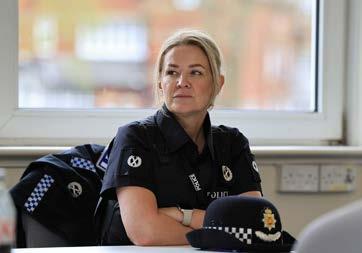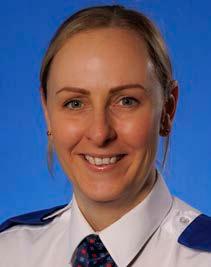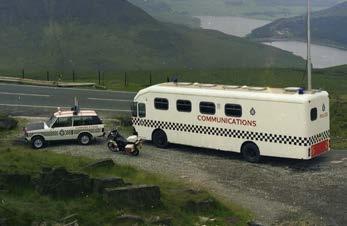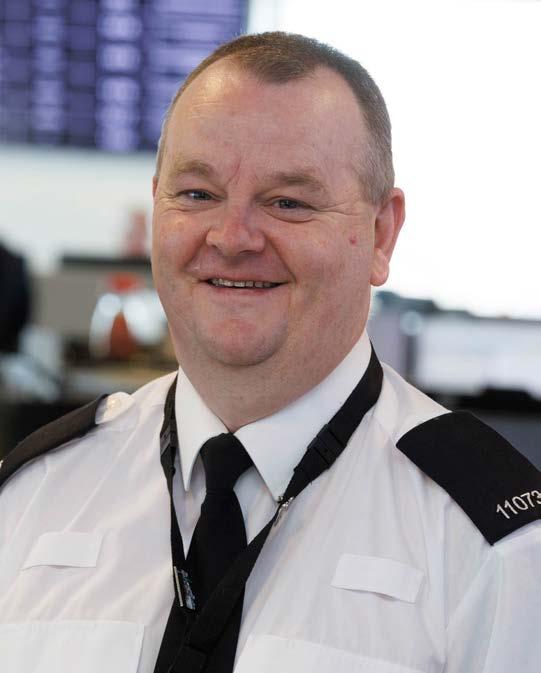

THE VOICE OF GREATER MANCHESTER POLICE OLDHAM · MAY · 2024
PCSO
PROBLEM SOLVING AWARD
TOP
WINS
This May marks my one-year anniversary here at Oldham as the DCI for Safeguarding, a role which I am passionate about.
I have spent more than half of my career within this area of policing. The activity that occurs day in, day out to protect vulnerable people of Oldham is tremendous.
The Oldham Complex Safeguarding team is one such team that manages the risk around the exploitation of children and have been recognised during peer reviews as having a motivated, committed, and experienced partnership approach to complex safeguarding and I have seen this in action on a daily and weekly basis. Often working with children who have a mistrust of adults or professionals.
It important to understand that any child can be exploited, but some children might be more at risk. Especially those who have experienced adverse childhood experiences (ACEs). ACEs can include physical, sexual, or emotional abuse, exposure to domestic abuse, and/or serious mental illness, living with someone who abuses drugs or alcohol, or whose parents are divorced, deceased, or imprisoned.
Vulnerable children are targeted by others to exploit them, this can include criminal and/or sexually and use “grooming” techniques to involve them in crime or violence. Recognising and seeing these children as victims is vital to ensure we work in partnership to improve outcomes for them.
I am proud that I started my career at Oldham and now 23 years later, have returned to lead the safeguarding teams here at Oldham and support our safeguarding duties.
Please use your professional curiosity when responding to a childrelated incident to understand what might be happening in that child’s life, especially those who may be committing crime or missing from home and seek advice from the Complex Safeguarding Team if you have concerns for a child who you think might be at risk of exploitation.
Together we can help protect children.
Detective Chief Inspector Lindsay Booth
PCSO Sharon Whitmore
Last month (April), GMP held the second Problem Solving awards in order to recognise the work done by GMP officers and staff to reduce repeat demand across the force.
PCSO Sharon Whitmore has become the district problem solving guru within the neighbourhood teams at Oldham. Sharon has taken a keen interest in problem solving and regularly provides advice to officers in regard to the scanning, analysis, response and assessment (SARA) model and long-term sustainable, partnership intervention. Sharon regularly scans forcewide data and highlights emerging problems to the neighbourhood team in order to ensure that early intervention at a place based level is able to take place. Recently, during regular scanning, Sharon highlighted a district owned repeat caller who had appeared in the top ten repeat callers for the force. Sharon scanned the data and conducted thorough analysis of the information held by GMP and partnership agencies Sharon immediately arranged a partnership meeting between services and ensured that a home visit was conducted at the earliest opportunity. A detailed care and intervention plan was created which Sharon managed throughout. Thinking outside of the box, Sharon arranged for the male to have a tour of the police station in order to
further cement the positive intervention and interaction with services.
As a result, the calls from the male stopped and his behaviour dramatically improved at home. The number of recorded crimes involving the male reduced significantly and this was sustained after the closure of the problem solving record. With Sharon’s intervention, demand reduced and a vulnerable male received the support that he needed.
In addition to this example, Sharon has become the district SPOC for neighbourhood civil orders, in particular, supporting district demand reduction by obtaining Criminal Behaviour Orders (CBOs) for repeat offenders. Sharon has provided advice to officers around the file build and correct use of the community impact statement which has resulted in over 30 CBO’s being obtained across the district and is the highest number across the force. Sharon continues to drive the use of civil orders and using her own initiative has developed a community tracker for officer awareness.
PCSO Whitmore is an outstanding member of the team whose work has been vital to the problem solving activity in the Oldham district and the increased use of civil orders for the force. Her work is exceptional and she continues to drive and inspire problem solving amongst the team.

2 THE BRIEF MAY 2024
Well-deserved recognition for Operation Logan dogs and their two handlers
In May 2022, following an intense fire at Bismark House Mill in Oldham which took four days to extinguish fully, demolition workers found human remains at the site.
A thorough investigation by GMP’s Disaster Victim Identification team found that the remains were of four Vietnamese men, Cuong Van Chu, Uoc Van Nguyen, Duong Van Nguyen and Nam Thanh Le, who had been reported missing around the time of the fire. They were victims of modern slavery, exploited and locked in the building by organised criminals; among the most vulnerable in our society.
In March, officers and staff involved in Operation Logan –the retrieval and repatriation of the four men’s remains to their families in Vietnam – were recognised in an awards ceremony at Nexus House. A month later, GMP’s Awards team celebrated the hard work of the operation’s other unsung heroes: victim recovery dogs Cleo (left) and Archie (right, retired) and their handlers, PC Gareth Greaves and Mark Richardson (retired). Gareth, Mark, Archie and Cleo convened at GMP’s Hough End facility to receive their well-deserved commendation certificates – and, for Archie and Cleo, a ceremonial squeaky ball.
Operation Logan was a particularly complex case for all involved, and the dogs were no exception. The fire had been extensive, taking four days to extinguish, and officers sifted through a total 4,500 tonnes of rubble to find the victims’ remains. The team was working through the heatwave of July 2022, with average temperatures of 200C and highs of 360C

Celsius. The debris included the remains of a tile shop which had burned down in the fire, so the teams had to contend with shards of shattered tiles and the residual fumes from burned ceramic.
“We were there for 12 to 14 hours a day, at the height of summer – every day Cleo was coming home with scratches and injuries to her paws, and then the next day she would go straight back out and do it again,” Gareth said. “Dogs don’t always know when it’s best for them to stop working for the day, so she would have kept going for even longer if I’d let her.”
In recent weeks five-year-old Cleo has distinguished herself again, covering around 42 miles of ground in Salford as part of the ongoing investigation into body parts found around the area. Gareth described her as “very loving – but hard as nails. She is a working dog.”
Archie is 11 and has now retired from the force along with Mark, his handler. “He seems like a real grump, but he is the softest, loveliest dog. My kids love him,” Mark said. “He’s independent, hard-working and eager to please – he is very easy to love and very rewarding to work with.”
The crucial, often harrowing work of the victim recovery team is commonly overlooked or misunderstood. “The job does get to you sometimes,” Mark said.
Gareth added: “People don’t always realise what we do or what it means, so we’re lucky to have a close-knit team who support each other. At the heart of it, our job is bringing the lost home.”

3 THE BRIEF MAY 2024
Child protection Op Avro goes forcewide
Each month, GMP’s Operation Avro deploys extra resources in a single district in a proactive drive to target the crimes that matter the most to our communities.
In April, for the first time, Op Avro launched across the force in a bid to tackle criminal and sexual exploitation and safeguard young people.
Using high visibility, resource-intensive and proactive policing, we launched an action-packed day of activity across Greater Manchester, focusing on child protection and safeguarding.
The day started at 5am, with warrants across the force targeting people suspected of sexually or criminally exploiting young people. In total, 33 individuals were arrested for a variety of offences including serious sexual offences and rape, indecent images offences, and possession with intent to supply class A and B drugs.
The team was joined by PD Ted, Cheshire Constabulary’s ‘digital dog detective’, whose specialist skills help us identify hidden digital devices which may be used to hold illegal images. With devices becoming smaller, and criminals becoming more adept at concealing them, these skills are an excellent asset to our investigations.

Proactive operations in Bury and Rochdale saw officers and staff from our dedicated complex safeguarding teams partner with local authority Trading Standards officers to visit several shops suspected of selling vapes to underage children – this is a priority as it can often lead to children being coerced into criminal activity or sexual exploitation.
In total, £20,000 worth of amount of illicit or non-compliant vapes were seized, along with illegal sweets and imitation firearms.
Teams across the force delivered training sessions to hoteliers, businesses and taxi licensees to make sure they were equipped with the tools and confidence to challenge inappropriate
behaviour and feel confident knowing what to look out for when they come into contact with young people.
Our specialist behavioural detection teams were deployed to hotspots across the force, with a focus on reducing youth violence. To compliment this, our Complex Safeguarding Teams delivered several workshops in local primary and secondary schools, discussing important topics such as healthy relationships, staying safe online, and how criminal gangs look to exploit young people.
Education and engagement are key to preventing and addressing exploitation before it takes hold, and we intend to continue this critical work in our communities, talking to as many people as we can who may be the first
point of contact for young people at risk of exploitation. If we can increase awareness of the signs that a child may be at risk, ensure we’re asking young people the right questions in the first place and provide a safe space for them to talk, we have a better chance at protecting them from harm.
The training school at Sedgley Park held two events for officers and staff, providing inputs on recognising the signs of child abuse, listening to children and understanding the impact of adverse childhood experiences.
With more resources and increased investment into tackling exploitation and protecting children from harm, we are working around the clock to face these issues head on. From improving
4 THE BRIEF MAY 2024
training for frontline officers, ensuring they stay professionally curious to maximise chances of early intervention, to specialist detectives targeting online predators, we are taking advantage of the breadth of experience and resources we have across the force, with one common goal of safeguarding young people from harm.
DCI Suzanne Keenaghan, force coordinator for child protection, said: “We want to empower our communities to be alive to the signs of exploitation, provide avenues for them to report concerns to us and our partners, and most importantly, instil public confidence to know that we will act upon any intelligence that they give us.
“Sadly, people will always seek to exploit children and vulnerable people, but I am confident that we have rigorous safeguarding mechanisms in place across
Greater Manchester, and relentless teams of detectives and frontline officers who are pursuing offenders.
“At the heart of the work we do is building trusted relationships with the children and young people who are at risk. The activity today gave us the chance to speak to thousands of people in our communities, take criminals off the streets, and build on our intelligence picture about children who are facing or experiencing exploitation. With help from our partners and the public, we have seen significant results today and we will continue to build on this as not to become complacent.”
Signs a child may be at risk
• While this is not an exhaustive list, some signs of exploitation include:
• Changes in behaviour or appearance



• Not coming home when they say they will, or going missing
• Becoming uncharacteristically secretive or reluctant to talk about friends or relationships
• Struggling to engage in school
• Overly protective of their messages or social media accounts
• Having more than one phone
• Accompanied by individuals older than them
• Concerns surrounding the use of alcohol or drugs
• Sudden changes or fear of people or friends
• Unexplained gifts or money
• Uncharacteristic or age-inappropriate sexual discussions or language
• Evidence of sexual images being shared (by themselves or by others)



5 THE BRIEF MAY 2024
Right Care, Right Person: experts who can give
Right Care, Right Person (RCRP), a national programme which aims to ensure that individuals in need receive the right care from the right agency, will launch at GMP on 17 June.
In preparation for the launch, it is mandatory that all GMP officers and staff complete the short RCRP training course available on College Learn at https://www.learn.college.pnn. police.uk/CL/Content/Summary/47978. If you have any queries, please email the project team at RCRP@gmp.police.uk.
Please be aware that Right Care, Right Person has not yet gone live and no changes currently need to be made to the way we work.
Once RCRP has launched, staff in the FCCO will benefit from the support of expert floorwalkers, who will provide guidance and insight where needed into all aspects of the policy. Ahead of the rollout, you can learn some more about them below:
Abigail Smith (Abi)
RCRP will be a big step in the right direction for both the force and the public. They are getting the right help sooner; there will be more officers free to deal with crime, and fewer calls coming into the FCCO.
I aim to support my colleagues the best way I can with the understanding I have around RCRP. I know a lot of people will be worried about this coming in and thinking about repercussions and worst case scenarios; I will reassure them that they are supported by the policy.
Chloe Goulden
To me, RCRP means that GMP can now focus more closely on fighting crime and saving lives of people in immediate danger.
RCRP is very important for our force as it helps us use our resources and officers for their intended purpose. My colleagues can expect my full support while rolling out RCRP – I will be on hand to help explain any unclear incidents which arise and offer my advice on how to best serve the public through RCRP.
Once RCRP is fully rolled out and all staff have settled in, it will be a massive benefit to GMP forcewide.
Matthew Jones
RCRP means that the police can provide the right support to the public and help to fight crime, while also making sure the concerned party gets the correct support. It is a positive change to the force and
can be daunting, but the policies in place are aligned to go smoothly.
I will always be on hand to make sure my colleagues have full support whenever it is needed, answer questions without judgement and help to guide them through the correct avenues.
Thomas Caldecott
RCRP means that the people in our communities receive the correct care from the correct agency – some of the training we’ve received has clearly shown that police attendance isn’t always the best way to help people, and can sometimes even make things worse. It will also help GMP be able to respond to actual policing needs.
I will be on hand to offer support with any aspect of RCRP whenever it is needed.
Nathan Cortes
RCRP not only makes our jobs more effective, it’s also there to help the people we serve by getting them the right help as soon as possible, rather than passing them through multiple agencies, which delays the help they need. For GMP it’s important because we can use our resources to spend more time helping those who truly need us.
During any massive culture change, even small details can seem like a big challenge. This is what the floorwalkers have been trained for: to assist with questions and offer clarity during this changeover period. We will be walking around the room looking to help anyone who wants to clarify anything or are

unsure if they are making the right decision.
If I could say one thing to those who will be working with me, it is that there is no such thing as a bad question.
Almas Barker
RCRP will help police officers to get back to policing and help victims instead of sitting in a hospital for hours, freeing up more police to work on the beat, protect the public and prevent crime.
I will give my colleagues 100% as a floorwalker and support them in their decision-making. My advice to my colleagues would be to read more about the changes coming on the intranet RCRP hub, and check Sherlock – but do not hesitate to ask supervisors and floorwalkers. Attend the training sessions if you can, as they are very interesting and the trainers are always happy to hear your views.
Sam Grice
RCRP will bring a positive change to GMP by enabling officers to focus on tackling crime and provide a better service for victims.
It will enable people who are suffering from mental health, social and care needs to access services which are trained to support them faster.
I believe my skills as a trainer and mentor will assist my colleagues in the room.
Hayden Leigh
RCRP to me means one thing: a safer environment for the people of Greater
6 THE BRIEF MAY 2024
Person: meet the give the right advice
Manchester, enabling them to receive the care they need firsthand from the right agency. It also means police officers will be able to carry out their duties correctly and in a timelier manner for those who need the police for policing purposes, giving us and members of public better access to the resources we need.
As a floorwalker, call handlers can expect my full support, and more importantly a helping hand to reassure they are doing the right thing in the correct manner.
We are a team, and we have an at times challenging job with a duty of care to the members of public who need our help. I will help in any way possible to make sure I and my colleagues are equipped to give that care to the public.
Imogen Stone
RCRP means the public get the right support where they need it without feeling criminalised.
The support I can offer to colleagues while I’m on the floor in the FCCO will include answering questions if something feels confusing: an issue we may have

put on a Grade 1 in the past could no longer be something that the police force deal with; some call handlers may disagree with this, but I am there to explain why this is the case and what they need to do to get the caller the correct care and assistance in that moment of need.
I have been trained in what we will keep doing and what we will no longer deal with, so I will use this training to help others across the floor.
Please don’t feel afraid to ask any questions: this is a change affecting the whole of GMP, and we floorwalkers are here to support and help on the jobs you may have questions about.
Natalie Aker
RCRP means there will be more resources available to deal with incidents that are meant for the police.
I will be there to help colleagues with any questions and filling in the forms; I will help them in the best way I can with the knowledge gained from my training.
During the training sessions I have been engaging in conversations and





asking questions that I feel colleagues may ask me when I am floorwalking, so I can give them an informed answer.
Dalien Haughton
Simply put, RCRP involves getting the right care for the right person!
This means we will be providing a better service to members of the public and signposting them towards the appropriate help – this also free up crucial resources to attend the core functions of policing.
During go-live period I will be one of the floorwalkers in the FCCO; I am here to help with any questions that you may have. I cannot promise I know all the answers, but I will endeavour to work with call handlers during this challenging period and help to get clarity on anything you may be unsure of.
Row 1: Abigail Smith, Matthew Jones, Tom Caldecot, Hayden Leigh, Dalien Haughton,
Row 2: Samantha Grice, Chloe Goulden, Craig Gandy, Natalie Alker, Natalie Alker, Natalie Alker, Nathan Cortes.




7 THE BRIEF MAY 2024
The Forcer Protocol initiative goes national in May
GMP’s groundbreaking veterans’ initiative is set to become a national protocol, with its next iteration rolling out in Cumbria in early May.
The Forcer Protocol is a practice used by the police to ensure that key information is available when searching for service veterans who are lost or have gone missing. GMP was the first police force in the UK to adopt the protocol, which was initially implemented as a sixmonth pilot.
The protocol is named after Alan Forcer, a former soldier who took his own life after being reported missing in 2020. Alan suffered with complex PTSD, extreme anxiety, physical pain, and debilitating depression after serving in Northern Ireland and Kosovo as a teenager. Some months before his death, he was informed that the charity which had been providing him with mental health assistance would no longer be able to do so due to funding issues.
The Forcer Protocol follows this approach:

How much do you know about TRiM at GMP?
Trauma Risk Management (TRiM) is a confidential, peer-delivered risk assessment and ongoing support system, provided by GMP to help in the management and support of staff and officers after an on-duty traumatic event. While TRiM is not a clinical intervention, counselling, or formal psychological treatment, it does allows qualified peers to conduct structured risk assessments and identify likely reactions to potentially traumatic events. Its aim is to identify those people that need early support and assist them in receiving it.
How does it work?
When notified of an incident via the TRiM email, a TRiM manager starts the process.
1. When a person is reported missing to the FCCO, the call handler will then ask whether the missing person is a veteran in every case as part of the initial assessment.
2. Next, the log is switched to GMP’s Force Operations Centre, where the staff will check Safe and Found Online information aggregation platform for crucial information about the veteran.
3. The district will then identify the risk, investigate, and locate the missing person safe and well.
4. Finally, a referral is then completed on a Single Veteran’s Pathway to ensure that the veteran gets the correct support they need.
Due to the success the Forcer Protocol has achieved with GMP, it is now being rolled out at Cumbria Constabulary as it becomes a national protocol.
Ch Insp Mark Mangnall, who has played a huge part in the design and implementation of the protocol, said:
For larger incidents, a planning meeting will be arranged within the first 24 to 48 hours after an event. The planning meeting is held to identify those involved, understand the incident and its characteristics, and agree a tailored response. Some people who have been involved with the incident may be invited to take part in a risk assessment.
Larger groups may be asked to attend a TRiM incident briefing (TIB), where they will be provided with information on the incident and advice on how to manage their own emotional responses. TRiM ensures that there is a coherent, considered approach to the organisational response. The TRiM assessment is a chance to have a structured, non-judgmental, relaxed and confidential chat with a peer, about the incident you have been involved in.
What not to do
Staff and officers should not be referred to TRiM immediately after an incident, as people deal with traumatic events in different ways. Normal supervisory welfare should be used and if an individual requests TRiM, then a
“Countless hours of hard work have taken place in the design phase and implementation of the Forcer Protocol.
“Since it went live in November 2023, we have identified and located 68 vulnerable missing veterans. It fills me with pride that its success has gained recognition from the NPCC and nationally by other police forces. Cumbria Constabulary is the first force after the GMP pilot to adopt this protocol within their force area, paving the way that I am confident many will follow in the near future.”
referral should be made to trim@gmp. police.uk.
The TRiM assessment will not take place until at least 72 hours after the event; this gives individuals time to process what has happened.
Speaking to the team
The TRiM team within GMP is currently made up of Force TRiM Coordinator Tracy Harris and Senior Mental Health Specialist Glenys Wright. There are also 58 TRiM practitioners available whenever you need them.

8 THE BRIEF MAY 2024
Wellbeing at Greater Manchester Police

Annual Wellbeing on Tour event
This year the team’s Wellbeing on Tour is coming to you earlier in the year than usual, and will be spread across three weeks due to the bank holiday. You can find a list of where we will be and on what dates below; please keep an eye on the intranet over the coming weeks for more details of what the events will entail and who will be in attendance on each day.
• Bury: Friday 17 May
• Rochdale: Monday 20 May
• Oldham: Tuesday 21 May
• Nexus House: Wednesday 22 May
• Stockport: Thursday 23 May
• City of Manchester: Friday 24 May
• Stretford: Tuesday 28 May
• Swinton: Wednesday 29 May
• Wigan: Thursday 30 May
• Bolton: Friday 31 May
Oscar Kilo: Once upon a time
Over the last few months, in accordance with its commitments under the Police Covenant, Oscar Kilo (OK) has been developing a programme of support for police families.
Following in-depth research to understand some of the challenges policing families face, OK launched its OK family life programme in November, which brings together resources and support for families and friends of police officers – from nutrition guidance for the


whole family, to advice and workarounds for living with someone working shifts, to advice on mental health and identifying the signs of work stress and trauma in a loved one.
One key issue that the research has highlighted is that a simple acknowledgement of how tough it can be on all members of the family, including children, really helps. It can mean people feel less alone and more seen.
This is why Oscar Kilo has introduced its ‘Once upon a time’ campaign, which aims to help policing families explain to children why their loved ones might sometimes have to miss out on mealtimes, bedtimes or family celebrations.
As we all know, it’s not always possible for people working in policing to be around for a bedtime story; and it’s important that children understand why this might happen.
That’s why, Oscar Kilo launched its new campaign, centred around Red Robber Raid: a children’s book written and illustrated by the wellbeing team at Norfolk and Suffolk Constabulary, which gives families a chance to share a special bedtime story and explore together why a parent or carer might miss out on mealtimes, bedtimes, or other family time.
This campaign follows on from Oscar Kilo’s initial launch of its new online family hub in November and its ‘Thank you’ campaign at Christmas, which offered police forces, officers, and staff
the chance to say thank you to their families and friends and recognise the support they give every day to their loved ones in policing.
Oscar Kilo: new online hub for retirees and leavers
Oscar Kilo is delighted to launch its new leavers’ hub, offering resources to support both police staff and officers as they retire or leave policing.
The online hub offers advice and support through every stage of a leaver’s journey, from initial thinking about next steps, to creating a CV, networking, interviews, and wellbeing.
Providing support to those who are leaving or who have left policing is a key pillar of the Police Covenant, which recognises the unique contribution and sacrifices that both police officers and police staff make as a result of their service.
To create the online hub, Oscar Kilo worked with chartered psychologist Dr Ceri Jones and former chief superintendent Stuart Noble. Between them, the two have more than 20 years of experience helping those moving on from policing and other public sector organisations.
The leavers hub builds on our work to help police forces provide world-class wellbeing support for everyone who works for them.
You can view the Oscar Kilo leavers’ hub at https://www.oscarkilo.org.uk/ leaving-the-police.
9 THE BRIEF MAY 2024
Q&A: PC Andrew Sharkey, FCCO
What is your role in the FCCO?
I am a constable in the Force Operations centre.
What was your experience in the force before joining FCCO?
Prior to joining the Force Operations Centre, I worked on the Bolton district. My previous roles were in response; the public service team (appointment-based resolutions); Bolton task force (plain-clothes proactive work); integrated neighbourhood policing team; Bolton town centre neighbourhood; and Great Lever neighbourhood.
What attracted you to join the FCCO?
I was looking for a new challenge, to learn new skills, and develop myself further. I spoke to a friend and colleague who had just joined the branch, from whom I learned that it was a new team, established following the Kerslake inquiry after the Manchester Arena bombing. It aims to support and assist the force duty officer (FDO) in dealing with a variety of incidents, up to and including Operation Plato (The national response to a marauding terrorist attack).
What are your responsibilities?
My principal responsibilities include assisting with GMP’s response to major, critical and significant incidents by cascading information to our partner agencies and activating the Force Command Module. As a force public order loggist, I can assist with logging duties either in Silver Control or when deployed to an incident to support a Bronze command team. My day-to-day responsibilities include having oversight of significant incidents within the force, assisting with forcewide resourcing issues, assistance with high-risk missing persons, phone work and AtHoc image distribution. I undertake dynamic tasked research from the FDO and force critical incident manager (FCIM) in relation to fast-time intelligence checks, firearms research packages, Police National Database (PND) and other GMP systems interrogation. I also conduct day-today administrative tasks, such as preparation and presentation of the force daily management meeting (DMM) and force daily summary.
What is an average day like for you?
An average day in the Force Operations Centre revolves around working to support the FDO, FCIMs, senior leaders and district officers in a rapid and effective manner, providing whatever support and assistance we can offer with access to a multitude of systems. In truth there are no average days – the work is interesting and varied.
What is the biggest challenge of working in the FCCO?
Personally, my biggest challenge was developing myself to become comfortable with the numerous systems and IT that we use in the centre. Along with the systems that all officers will be aware of, such as iOPS, PND and other common research tools, there are other systems that we use in relation to major and critical incidents; such as Resilience Direct, which I use to inform and integrate with our partners – potentially up to a cabinet level.
The support and help that I have received within the team to learn and progress with the systems has been constant. I was new to how the FCCO integrates as a team, for example how
incidents come in via call handlers, and the effective distribution of the incident, and how that further links to partner agencies becoming involved, and the assistance they can offer.
What skills or qualities do you need to work in the FCCO?
For me, key qualities are a willingness to learn and to support our colleagues, senior officers and partners. However, anyone from any background, either operational or specialist would quickly fit into one of the five teams within the Force Operations Centre. We all bring diverse skills and experiences, and therefore learn and develop from each other. The transferable skills I have now are far greater than the ones I joined with.
Lastly, why would you recommend the FCCO to officers? It is completely different from anything I have done previously. I assist with incidents that I wouldn’t normally have become involved with. The partnership working required here is invaluable and provides good examples for anyone with promotional aspirations. The number of new systems that I can now access and interrogate to benefit others, has been put to effective use.
I have been fully supported in retaining and developing my previously acquired skills including Level 2 public order, National Public Order Evidence Gatherer, and force loggist. Along the way I was fortunate enough to become one of two GMP National Interoperability Liaison Officers (NILO), a course provided by the Fire Service at their training college, which equipped me with a unique insight to their role and the support they can offer the police.
Lastly, as I personally approach the twilight of my career, it’s fulfilling to be involved with a productive team. I firmly believe that we make a positive difference to force operations on a regular basis.

10 THE BRIEF MAY 2024
Operation Host continues to tackle organised criminality in Oldham
In the week when we remembered the loss of our fallen colleague PC Alison Armitage who was killed in the line of duty 23 years ago, the Oldham district, supported by City of Manchester Central, came together to tackle organised criminality as part of Operation Host.
Two further arrests were made, and a warrant was executed as part of Operation Host - the investigation into the laundering and concealment of £250,000 cash and supply of Class A drugs.
In the early hours of Monday 4 March 2024, two defendants attended at Longsight police station where they have handed police £250,000 cash which they state is from drug dealing by another defendant.
That money had previously been stored at one address before being moved to another address for the last 12 months. All parties who were involved in storing the money were aware of where the money came from.
Prompt action by overnight by Detective Sergeant Matt Adshead and Longsight criminal investigations department teams led to the subsequent arrest of two of the defendants. Following this, a warrant was executed at the home address of a further defendant where more cash and assets were seized under Proceeds of Crime Act 2002 legislation.
To date, seven nominals have been arrested, interviewed and the case presented to the Crown Prosecution Service, securing not

only a remand into custody for the principle three offenders but a remand at court as well. In total, £291,000 cash has been recovered with ongoing financial work to seize any remaining assets linked to criminality.
Detective Superintendent Jude Holmes said: “This has been a team effort, brilliantly led by Detective Inspector Andy Day, involving Detective Sergeant Donna Youngjohns and Oldham Challenger, and everyone else involved. The team have all worked extremely long hours and gone above and beyond on this case.”
RCRP: e-learning now mandatory for public-facing and training roles
Right Care, Right Person (RCRP) will launch at GMP on Monday 17 June 2024.
To ensure the whole force understands GMP’s new position under RCRP, all officers and staff in public-facing and training roles are required to complete a 15-minute online training package via College Learn – this mandatory online training needs to be completed by Friday 31 May 2024.
The course can be found at https:// www.learn.college.pnn.police.uk/ CL/Content/Summary/47978 or by scanning the QR code below. Managers and supervisors are
expected to provide officers and staff with protected time to complete the training, which should take no longer than 15 minutes. DRMUs and training co-ordinators are expected to track completion and compliance and issue reminders to staff in their areas who are yet to complete the training ahead of the deadline.
Right Care, Right Person (RCRP) is a new national approach in policing, co-ordinated through the National Police Chiefs’ Council and supported by the College of Policing. It provides an accountable and consistent decision-making model which will be applied at the very first point of
contact, when the report is made to the police. The model will ensure individuals receive the right support by the right organisation, at the earliest opportunity through police forces working closely with partners, including local authorities, NHS trusts and mental health agencies.
More information can be found on the RCRP hub on the force intranet.
IMPORTANT: do not apply any Right Care, Right Person principles to incidents until after the launch date on Monday 17 June 2024.
The RCRP project team can be reached via RCRP@gmp.police.uk.


11 THE BRIEF MAY 2024
Family gold arrests for Neighbourhood Crime Team
Over the past few months, officers across GMP have responded to several burglaries that specifically targeted family gold.
Family gold is usually high purity, high-value gold jewellery – often bought as wedding gifts in Asian communities and passed down through generations, holding significant sentimental value.
Offenders are committing these burglaries in teams of two or three, and usually enter the properties after families have left their homes to attend evening prayers. They are entering either through open windows or even going as far as smashing them with objects found outside of the property, such as garden tools or bricks.
Officers in Oldham’s neighbourhood crime team have been tackling this type of crime in recent weeks with three arrests made following several simultaneous strikes in the Coppice and Limeside
areas of Oldham, following an investigation into family gold burglaries and burglaries where motor vehicles were stolen in Oldham.
Upon search of the property during the warrant, no family gold was located, but receipts for jewellers in a neighbouring area of the force were found and enquires continue into these to determine if there is a connection to the recent burglaries.
Superintendent Phil Hutchinson of GMP’s Oldham district, said: “This is a huge step in our efforts to reduce family gold burglaries in Oldham.
“We continue to conduct proactive and dedicated patrols with our neighbourhood officers in hotspot areas in Oldham and remain committed to providing people with crime prevention advice to keep their homes safe.
“Although no family gold was seized from the address, there were a number of lines of enquiry that

continue to be investigated by the team.
“We need to ensure that our communities together with jewellers are mindful and ask questions about where the gold originates from, and to do thorough checks with those who are wishing to buy or sell jewellery.
“This type of crime has a devastating impact on people who have fallen victim to it, it is an attack on themselves and their home, and our officers should continue to work hard to reduce incidents of burglary in our communities.”
Community and police join forces to repair neighbourhood team’s electric bike
Within Saddleworth, community spirit and collaboration are at the heart of the village’s daily life.
This sentiment was recently exemplified when the Saddleworth Neighbourhood Policing Team (NPT) partnered with, Saddleworth North Councillor Luke Lancaster, Lift Safe Ltd Oldham and local resident Mr Paul Gilbert, to see our Saddleworth North e-bike restored and fit for the summer months ahead.
The success of the repair can be attributed to the combined efforts of the Saddleworth NPT and the enthusiastic contribution of local residents and elected representatives.
With a new lithium battery and cosmetic repairs the bike is now, once again, ready to take our ward police community support officer out continuing their patrolling all of Saddleworth North’s villages.
Sergeant Connor Brook said: “The Saddleworth North area and wider Saddleworth & Lees area will once again see the areas Police Community Support Officer (PCSO) take to the streets on their refurbished ebike allowing our NPT to access areas that out patrol cars cannot take us.
“PCSO Lowther has a plethora of success stories from his patrols on the bike previously; including locating high risk missing persons in remote areas as well as apprehending off road bikers.
“I’m sure after the grateful donations and work carried out by Cllr Lancaster and Lift Safe Ltd Oldham thanks to Denshaw Resident, Mr Gilbert, we will see these successes and results continue for the Saddleworth NPT.”
Furthermore, the initiative highlights the power of grassroots collaboration in addressing local issues. By harnessing the collective knowledge and resources

of the community, solutions can be found that benefit all stakeholders involved.
By continuing to work together on projects that promote safety, foster unity, and strengthen community bonds, Saddleworth and Lees NPT can remain a shining example of effective community policing in action.
12 THE BRIEF MAY 2024


































